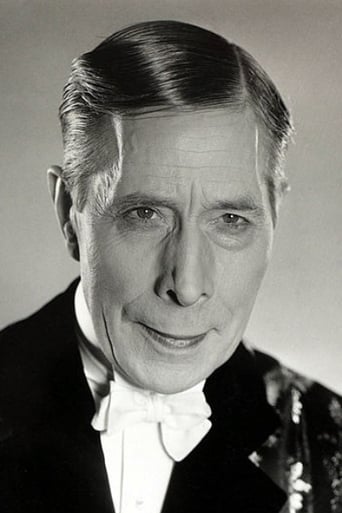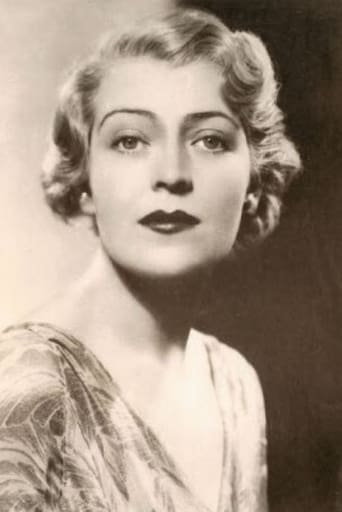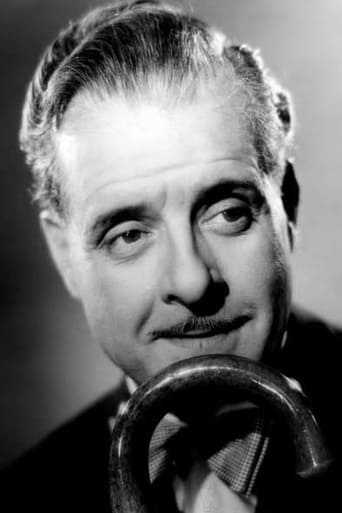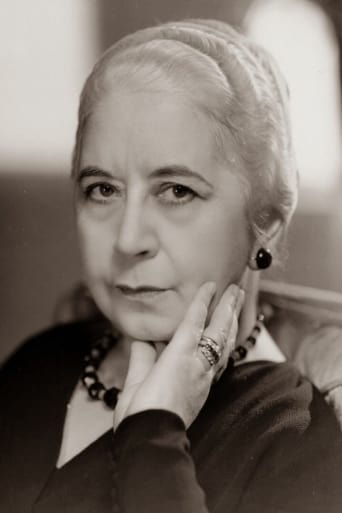mukava991
In "The Man Who Played God" the venerable George Arliss plays a famous and sweet-natured concert pianist who must cope with catastrophic hearing loss. There are two male-female romantic love subplots, but the story is essentially about philosophical and moral issues. The movie is best remembered not for Arliss, who was the main attraction, but for a supporting role beautifully played by the future screen queen Bette Davis, who for the most part is also very well photographed by James Van Trees, enhancing her unique presence. Amusingly, Mordaunt Hall of The New York Times in his review of the film faulted her for speaking "too rapidly for the microphone." But Arliss himself, as an artist suddenly forced to reconstruct his whole approach to life, is sympathetic and compelling despite the lipstick he habitually wore, in the style of many male actors of that time. He is ably supported by a thoroughly winning cast including Violet Heming, Ivan Simpson, Louise Closser Hale in an uncharacteristically non-dour role as the pianist's loving, intelligent and supportive sister, and even a very young Ray Milland as half of a distressed young couple whose desperate utterances are deciphered from afar by Arliss with the aid of binoculars and freshly acquired lip-reading skills. The studio-created ambiance of bustling city streets, whether "Paris" or "New York," is less phony looking than the usual replications thanks to careful lighting and well-planned camera angles.
calvinnme
This is an unusual little film starring George Arliss as master concert musician Monty Royale whose young pupil Grace (Bette Davis) confesses her love to him. He's of course flattered but unsure of what the coming years will bring considering their age difference. He agrees to marry her if she feels the same in six months. However, near the beginning of the six month period something happens that leaves Monty unable to enjoy his own music - he is left completely deaf from an explosion. He becomes a bitter man who shuts himself away from everyone. He does take some training in learning to read lips so that he can deal with the world in his new condition, and this training leads him to realize that he now has the means to bring happiness to people in a different and more individualized way than he could as a musician. With the aid of some powerful binoculars left behind by Grace, he can read the lips of the people in the park across the street, learn their troubles, and with his large family fortune and influence, save lives or maybe just bring someone some welcome happiness. Soon the joy of living has reentered Monty's life, and he is happy that the six month waiting period is soon to end and Grace will be returning from California - they can be wed. He's people watching at his window when Grace suddenly appears in the park across the street. She sits down with someone and begins to have a conversation. Monty "listens in". What will he discover and how will he react? Watch and find out. In addition to the fine work of George Arliss and Bette Davis, the supporting roles are well played here too. Ivan Simpson is great as Monty's gentleman's gentleman who has no trouble sternly lecturing his master when he needs it, yet is such a formal person that he cannot leave the house -even on an urgent errand - without his hat, and there is even a very small part played by a very young Ray Milland. Highly recommended for fans of early 30's films. It has some precode elements in it, particularly the part where Monty is wrestling with God and his loss of belief, but I would not call it a precode at all.
David Fowler
Tpatbour - In your comment you stated that Bette Davis appeared in "B programmers" such as this before she graduated to "A pictures". She did, indeed, appear in many B films during her early years at Warner Bros. "The Man Who Played God", however, is NOT one of them. It is a George Arliss vehicle and it must be clearly understood that George Arliss did NOT make B films! Any Arliss film is unquestionably a prestigious A production. In the 20's and early 30's George Arliss was one of the biggest stars of stage and screen, not just in America, but in the world. You would do well to understand a bit more about the history of a given subject before you attempt to write about it. As for your opinion that this film is "no masterpiece", there are many who would disagree with you.
lugonian
THE MAN WHO PLAYED GOD (Warner Brothers, 1932), directed by John G. Adolfi, from a short story by Gouverneur Morris, stars Academy Award winning actor of 1929s DISRAELI, Mr. George Arliss, in a remake to his 1922 silent screen adaptation. Essentially a showcase for the prestigious Arliss in what might have been just another movie assignment to his credit, it's best known as the motion picture responsible for the advancement of Bette Davis in her first important screen role, following her start at Universal in 1931, thus the beginning of her long association at the Warner studio where she would become its major star attraction before the end of the decade.Of the George Arliss films in circulation and video today, THE MAN WHO PLAYED GOD holds up remarkably well mainly due to its theme and timely message that never really grows out of date, overlooking the fact that such a story echoes passages from the Holy Bible ("A man who has never suffered has never lived," "If you kill yourself, you'll suffer ten thousand times more" or the age old question, "If God is so merciful, how could he allow this to happen to me?") preached during Sunday services. The title has nothing to do with a actor starring in a religious play, but in fact, about a man whose life becomes an "empty shell" only to change from being a troubled soul after losing his hearing to forgetting his bitterness by helping others. While much of the Arliss movies produced at Warners during the early 1930s were extremely popular, most consist of too much dialog and lack of motion to stir up interest. THE MAN WHO PLAYED GOD is one of those few that doesn't fall into that category thanks to its fine direction, screenplay and supporting players.The story opens in Paris where 50-year-old Montgomery Royal (George Arliss), a concert pianist, engaged to his protégé, Grace Blaine (Bette Davis), a girl more than half his age, agrees to give a private backstage recital for a monarch. During a performance, an anarchist, intending to assassinate the King (Andre Luguet), explodes a bomb. While everyone has escaped injury, Monty becomes stone deaf. Monte returns to his New York City apartment where he finds it difficult to adjust to his world of silence. He becomes bitter, hating God to a point of canceling his order for an organ he was going to donate to a church in memory of his deaf and religious mother, Margaret Ruth Royal. Without the ability to hear what's precious to him, his music, and becomes an embittered recluse. Coming to the point of suicide by nearly jumping from the window, his loyal butler Battle (Ivan Simpson) saves him in time from eternal suffering by offering him something to occupy his time. Having been taught lip reading, he takes binoculars to spy on people across the street in Central Park, reads their lips, learning of their troubles, and becoming a sort of guardian angel in helping those in desperate need without revealing himself. Finding he now has a purpose in life, he must face another greater challenge involving the loyalty of young Grace.The supporting cast consists Donald Cook as Harold Van Adam; Louise Closser Hale as Monty's sister, Florence; Oscar Apfel as the Lip Reading Teacher; Paul Porcasi as the Concert Manager; with Hedda Hopper, Murray Kinnell and the unbilled Ray Milland. Of the supporting players, second billed Violet Heming appears to be the least familiar, yet in a role that nearly surpasses the one given by Bette Davis. Her sophisticated mannerisms come close to that of the better known Verree Teasdale, as a widow who secretly loves Monty, in spite of his engagement to another. The Bette Davis trademark is not too much evident at this point, in fact, having the make-up department giving Davis the Constance Bennett manner. Davis would be paired with Arliss one more time in the rarely seen comedy, THE WORKING MAN (1933).In the midst of horror melodramas, gangsters and pre-code sex dramas playing in theaters at the height of the great depression, THE MAN WHO PLAYED GOD comes as a sort of inspirational drama that offers hope to those who have given up on life, with the moral of the story being, "The Lord works in mysterious ways." Remade by Warners as SINCERELY YOURS (1955) with TV personality Liberace in the role originated by Arliss, whose piano playing served him better than his acting, the latest screen adaptation, that should have improved over the old, didn't, making this 1932 version the one worth viewing. THE MAN WHO PLAYED GOD, which has never been distributed to video cassette or DVD, can be seen on Turner Classic Movies. (***)




